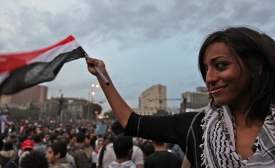crisis coverage
Growing aspirations of youth in MENA regarding economic opportunities and political rights very quickly raised the bar for what governments need to do. To shed light on the implications of these changes and opportunities in the region and its inclusion in a global economy, the World Bank will host a discussion titled Arab Voices and Views...
An African Union committee is meeting this week to consider a proposal by Libyan leader Moammar Gadhafi to transform the AU bureaucracy into a powerful continental authority. The eccentric Libyan leader still casts a long shadow over African affairs, even as his 42-year rule is under threat at home.
Protests have already toppled governments in Tunisia and Egypt, leaving other Arab countries faced with widespread discontent. The unrest caught most people by surprise — both inside and outside the region — and has fundamentally upended at least five conventional beliefs about the Arab world
In past sessions of the Al Jazeera Forum, held each year in the network's Qatar hometown, reform in the Arab world was discussed with an air of resignation: "Someday...maybe."
But like other pro-Qaddafi groups that have sprung up here since the rebellion in Libya began, what it lacks in logistics it makes up in loyalty. “We’re all ready to die for him,” Mr. Maiga said. “He’s done so much for us, after all.”
But the 22-member league's decision also tells us a lot about Arab views of U.S. power. Throughout the Libyan crisis, we've heard from pundits and politicians that the Iraq war tarnished brand America beyond repair, and made U.S. leadership non grata in the Mideast.
I read the news on a friend’s Facebook page (one of my primary sources of news and analysis out of Egypt these days), that a coalition of Egyptian youth groups had rejected an invitation to meet with U.S. Secretary of State, Hillary Rodham Clinton.

They should appreciate the fact that shutting out those you disagree with is not sustainable.







